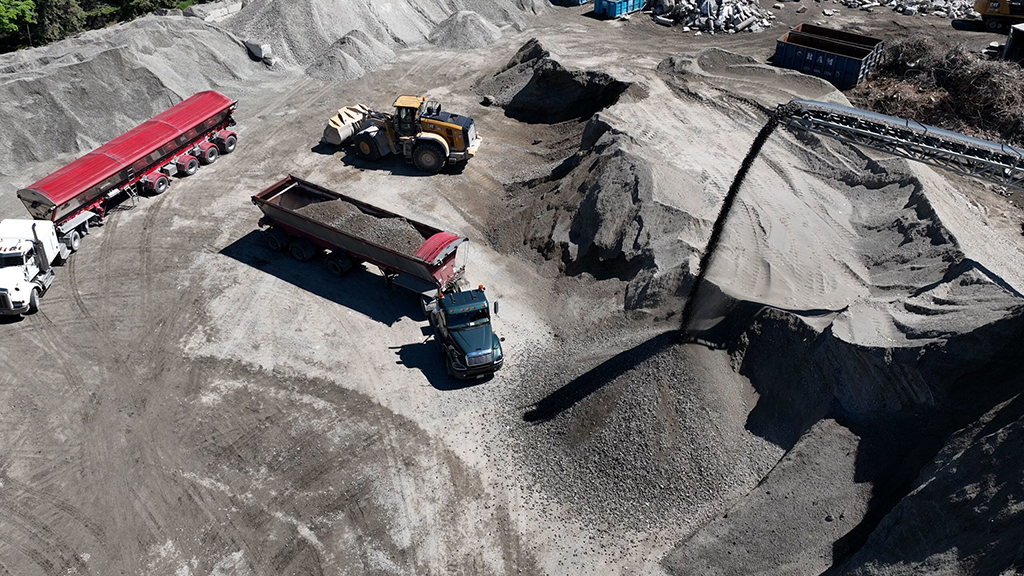TORONTO — A recent session hosted as part of the Ontario Society of Professional Engineers (OSPE) development series discussed how the increased use of Recycled Crushed Aggregates (RCA) can lower construction project costs and carbon emissions.
It comes as more associations and stakeholders come forward urging government to streamline and harmonize design specifications as well as consider the use of RCA for more projects.
The session, held on May 8, emphasized the need to expand and maintain Ontario’s transportation infrastructure to keep up with population growth and an increasing state of good repair backlog and how using RCA can deliver more from municipal capital budgets while also helping them reach their net-zero targets.
RCA is reclaimed asphalt pavement and/or concrete removed from construction sites across Ontario.
Findings presented from a 2024 research report conducted by Engtec showed RCA testing demonstrated comparable performance in terms of load-bearing support in pavement structures and no compromise to the structural integrity of the pavement when using crushed concrete. The research concluded there is no need to increase layer thickness when using crushed concrete in pavement structures, a release reads.
“Over the last 20 to 25 years, there has been significant improvement in these materials, including both their quality and quality control processes,” said Dr. Salman Bhutta, principal engineer at Engtec Consulting, who delivered the keynote presentation.
“RCA is a cost-effective and environmentally friendly alternative to primary aggregates. It supports sustainability goals, without compromising structural integrity or long-term performance.”
Raly Chakarova, executive director of the Toronto and Area Road Builders Association (TARBA) also spoke with attendees, stating the industry has long supported the use of RCA.
“Concrete and asphalt have already met performance specifications when originally used. When reclaimed, they undergo an additional rigorous process of crushing, screening, testing, and quality control to be repurposed for their application as construction material in new projects,” said Chakarova. “Use in Ontario and internationally has shown that RCA is a high-performance material, with numerous construction projects and studies concluding that its geotechnical properties are equal and sometimes superior to primary aggregates.”
According to the release, 180 million tonnes of aggregates are used annually in Ontario, with more than 50 per cent used in roadways, bridges and tunnel construction. Less than seven per cent currently come from recycled sources.
TARBA is leading a coalition of industry associations to increase awareness and adoption of RCA across Ontario.
They are calling for the following:
- Including RCA use as part of the tenders for roads, bridges, sewer and watermains, subdivisions, and transit projects;
- Aligning municipal standards with Ontario specification OPSS1010 to reduce administrative burden, ensure quality and compliance, and encourage wider adoption; and
- Collaborating with industry to build capacity and confidence on quality control measures and a wide variety of applications for RCA.
“Advances in material science and recycling technologies have demonstrated that RCA performs comparably to traditional alternatives in many applications. Most significantly, the use of RCA reduces the demand for valuable finite natural resources, such as sand, gravel, and crushed stone,” said Sandro Perruzza, CEO of OSPE. “The use of RCA in engineering designs will dramatically reduce the amount of waste going to landfill while decreasing road congestion and the associated carbon emissions, both favourable outcomes for sustainable development.”
The Ontario Road Builders’ Association (ORBA) is also urging the provincial government to introduce legislation that would compel municipalities to harmonize construction and design specifications.
The associations sates a patchwork of inconsistent standards and specifications is driving up project costs, creating administrative inefficiencies and slowing down the delivery of infrastructure.
“Harmonization is a practical solution to a long-standing challenge,” said Walid Abou-Hamde, Chief Executive Officer of ORBA. “By aligning standards, we can deliver better infrastructure, faster and more affordably. It’s a win for municipalities, a win for industry, and a win for Ontarians.”



Recent Comments